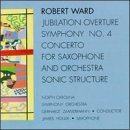| All Artists: Robert [Composer] Ward, Gerhardt Zimmermann, North Carolina Symphony Orchestra Title: Robert Ward: Jubilation Overture; Symphony No. 4; Concerto for Saxophone; Sonic Structure Members Wishing: 0 Total Copies: 1 Label: Albany Records Release Date: 8/18/1995 Genres: Alternative Rock, Classical Styles: Forms & Genres, Concertos, Theatrical, Incidental & Program Music, Historical Periods, Modern, 20th, & 21st Century, Instruments, Reeds & Winds, Symphonies Number of Discs: 1 SwapaCD Credits: 1 UPC: 034061000112 |
Search - Robert [Composer] Ward, Gerhardt Zimmermann, North Carolina Symphony Orchestra :: Robert Ward: Jubilation Overture; Symphony No. 4; Concerto for Saxophone; Sonic Structure
 | Robert [Composer] Ward, Gerhardt Zimmermann, North Carolina Symphony Orchestra Robert Ward: Jubilation Overture; Symphony No. 4; Concerto for Saxophone; Sonic Structure Genres: Alternative Rock, Classical
Ward (b. 1917) writes the kind of American Romanticism that puts him in line behind Roy Harris and Howard Hanson. Not a bad line to be in. Ward's music is tonal and, in places, exuberant (as in Jubilation Overture from 1... more » ![header=[] body=[This CD is available to be requested as disc only.]](/images/attributes/disc.png?v=a4e11020) ![header=[] body=[This CD is available to be requested with the disc and back insert.]](/images/attributes/disc_back.png?v=a4e11020) ![header=[] body=[This CD is available to be requested with the disc and front insert.]](/images/attributes/disc_front.png?v=a4e11020) ![header=[] body=[This CD is available to be requested with the disc, front and back inserts.]](/images/attributes/disc_front_back.png?v=a4e11020) |
Larger Image |

 Track Listings (7) - Disc #1
Track Listings (7) - Disc #1